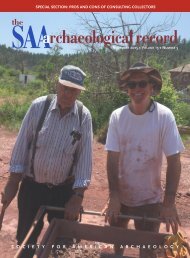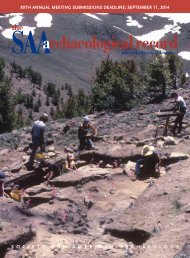SAA
Nov2016_web
Nov2016_web
Create successful ePaper yourself
Turn your PDF publications into a flip-book with our unique Google optimized e-Paper software.
VIDEO GAMES AND ARCHAEOLOGY<br />
ARCHAEOGAMING, ETHICS,<br />
AND PARTICIPATORY STANDARDS<br />
L. Meghan Dennis<br />
L. Meghan Dennis is a Ph.D. student in archaeology at the University of York.<br />
Archaeogaming?<br />
Society, more and more, has become structured and integrated<br />
into the digital world, as we form and maintain relationships<br />
unbound by geographical distance and locate our<br />
lives and our memories within virtual spaces, such as social<br />
media, Internet webpages, and the virtual communities of our<br />
shared interests. How archaeologists function in this digital<br />
space is a topic that is increasingly being explored through<br />
scholarship in digital archaeology and digital heritage.<br />
In light of the cultural and economic significance of the<br />
video game industry in today’s society, archaeogaming, or<br />
the application of archaeological principles and methods of<br />
data collection to the worlds of video games, is a natural outgrowth<br />
of archaeology as a discipline. As archaeologists, the<br />
search for material culture takes us many places, and<br />
increasingly, that material culture we seek to study, that<br />
material culture from which we draw our data, is located<br />
within video games.<br />
According to the Entertainment Software Association, total<br />
US consumer spending on gaming content exceeded $22 billion<br />
in 2014. Data from that organization, which is the<br />
largest voice for the video game industry in the United<br />
States, indicates that 155 million Americans play video<br />
games, and demographically, that gamers are of all ages,<br />
genders, races, and sexualities (Entertainment Software<br />
Association 2015). Gaming is now, dollar for dollar and hour<br />
for hour, the most lucrative and utilized entertainment activity<br />
in the United States. Its reach is beyond film, beyond television,<br />
and beyond our best efforts, as archaeologists, at<br />
community engagement.<br />
Archaeogaming posits that immaterial worlds, such as those<br />
found in video games, are viable spaces in which to study<br />
material culture, recognizing that created cultures are the<br />
inherited product of cultural influences from within our own<br />
“real” world. By examining each game, we can isolate the particular<br />
culture of the created world, can apply archaeological<br />
and ethnographic data collection techniques, and can<br />
address larger issues of theory and practice in nondestructive,<br />
replicable ways. This article seeks to begin the task of<br />
determining what ethical concerns should be addressed in<br />
that framework, while taking into account current challenges<br />
in researching in video game worlds, including the Gamer-<br />
Gate movement.<br />
The Applicability of Current Archaeological Ethics<br />
If we are to consider archaeogaming a legitimate form of<br />
archaeology, there are issues beyond the obvious concerns of<br />
methodologies and excavation techniques to address. As a<br />
new area of research, drawing on modern material cultural<br />
studies, ethnography, field archaeology, media studies, and<br />
digital archaeology, archaeogaming has the opportunity to<br />
look at the mistakes made in the past and to counter the<br />
errors of colonialism and ethnocentrism that marked the<br />
beginning of archaeological scholarship, many of which continue<br />
to this day. To accomplish this legitimization,<br />
archaeogaming has to be treated as more than just a fun<br />
exercise when unwinding after a long day in the field. It’s not<br />
enough to sign into World of Warcraft and look at Blood Elf<br />
architecture, or to ask Tomb Raider players on Twitter how<br />
they feel about new versus old Lara Croft as an archaeologist<br />
(Figure 1). Archaeogaming requires, in the pursuit of archaeological<br />
research, interaction with the individuals and<br />
groups that make up gaming populations; it requires interaction<br />
with those who play games, those who create games<br />
professionally, and those who critique games as a modern<br />
form of art. Archaeogaming has to be approached with all of<br />
the rigor and ethical consideration of formal ethnography.<br />
This begins, at its core, with determining ethical guidelines<br />
of practice.<br />
Within archaeological and ethnographic fieldwork, there is<br />
an established canon of ethical practice in relation to securing<br />
November 2016 • The <strong>SAA</strong> Archaeological Record<br />
29




